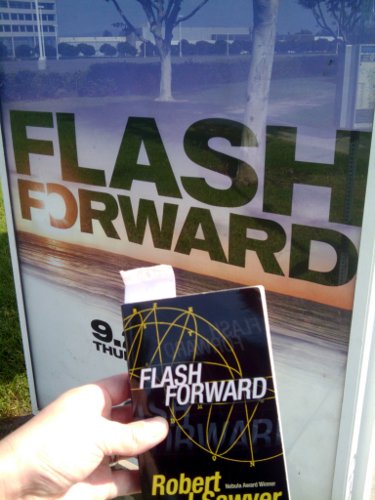There was a meme running through Twitter today to come up with movie titles for #scifiremakes. Here are my contributions.
- Shaka Sulu
- Schindler’s Arcology
- Obi-Wan Hur
- Droids on the Side
- Shuttlecraft 54, Where Are You?
There was a meme running through Twitter today to come up with movie titles for #scifiremakes. Here are my contributions.
And the award for Most Disturbing Use of an Alarm Clock in a Prime Time Show goes to… FlashForward! I got a weird kick out of recognizing it as Clocky (before the disturbing part).
I’ve been re-reading Robert J. Sawyer’s original Flashforward novel…

…for obvious reasons.
It’s been interesting to look at both where the TV series diverges from the book: the setting, the time scale, recordings, and in most cases the cast — and where it tracks: the concept, the impact of the worldwide blackout on people now, the way different people approach their foreknowledge, a main character investigating his own murder, and the way the viewpoint organization just pulls together to take point on investigating the incident.
And every once in a while, a specific conversation is adapted. Demetri’s “You’re going to be murdered” phone call from Hong Kong and Theo’s phone call from South Africa are very similar. And there’s a discussion on the likelihood of an event hitting exactly on the hour that was practically lifted for episode two.
I doubt the TV show will tackle the question of whether the universe exists without observers (sort of “If a tree falls and no one is there to hear it, does it make any sound?” taken to the extreme) or the long-term implications of life extension. And somehow I doubt the Large Hadron Collider and search for the Higgs boson are involved (though I noticed the TV show’s Lloyd Simcoe works at Stanford, which does have their own particle accelerator).
It’ll be interesting to see where they go with this.
Entirely separate from the TV show, it’s also been interesting to look at the book’s predictions for the present day. Most of it takes place in 2009, but it was published 10 years ago. I list a few items — like getting the Pope’s name right, but missing the explosion of cell phones — in my review of the book from when I read it last year.
Then there’s the suggestion made that one could prove the future can be changed by demolishing some major landmark that many people saw in their visions, but “I don’t suppose the National Park Service is going to let us do that.” In my head, I imagined a deadpan voice saying, “You can’t blow up a national monument.” Hmm, I doubt the cause of the blackouts in the TV show will be robots from space. 😉
Realized why the Japanese name for Optimus Prime bugs me: “Convoy” implies more than one vehicle. Maybe it’s a translation issue?
Possible spoilers for the beginning of Heroes Volume 5: Redemption.
So. Last season, Nathan Petrelli died and Matt Parkman telepathically brainwashed Sylar into believing he was Nathan, and since Sylar can change his appearance, as far as anyone can tell, he may as well be Nathan.
Now, Matt has a version of Sylar living in his head like Harvey, the neural clone of Scorpius living in John Crichton’s head in Farscape. This Sylar seems to be under the impression that he was pulled out of his body and put into Matt’s head. Meanwhile, “Nathan” seems to be exhibiting flashes of Sylar’s personality and powers.
In short, Sylar’s personality exists in two places:
While I still think Sylar has long outstayed his welcome and should have been left for dead after the first season finale (they could have brought him back later with much greater impact if he’d been out of the picture for a year or two), I’m kind of intrigued by the possibility that the Sylar in Matt’s head might catch up to his body and find another version of himself occupying it…because I don’t think he’d be interested in sharing.
I finally saw Transformers: Revenge of the Fallen today.
In some ways it wasn’t as awful as I’d heard, and in some ways it was worse. I’m glad I waited for the second-run showing and only spent $1.75. Read on…